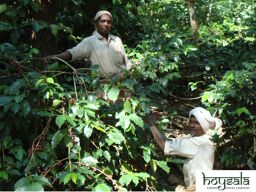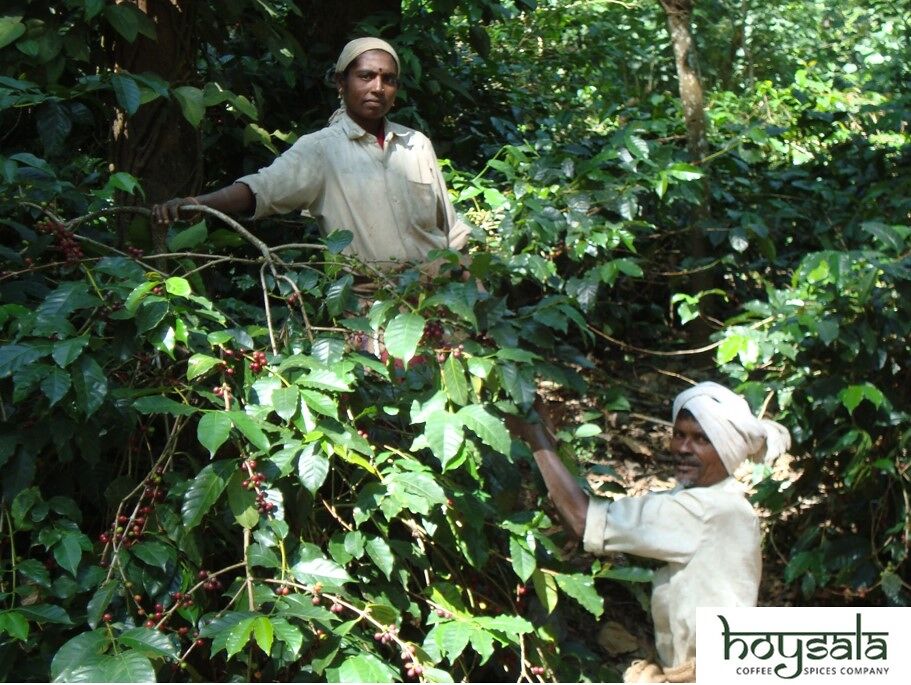We are proud to be chemical-free coffee farmers from India, dedicated to growing, processing, and exporting premium coffee. Our mission is to foster a sustainable community of farmers and consumers, creating mutual value and building long-term relationships.
Halasu AB
India - Robusta - Karnataka - Chikmagalur - HALASU - AB - Natural

India - Karnataka
Pick your crop :
Aromatic notes:
Spot price
€/kg
From coffee plants grown without chemical inputs
Two-tier shade-grown, the coffee cherries are harvested and passed through siphons to remove low-density and tree-dried fruit. The cherries are then spread Spread on multi-level iron mesh to dry. They are frequently raked to ensure even drying. The coffee is slowly dried to 12% moisture content before being bagged.
Dried beans are stored in their cherries to rest & stabilize water activity. They are then dry milled, checked for density and graded according to size. The beans are then sorted according to colour and garbled to remove major defects. The beans are now stored in specially lined Jute bags till dispatch.
Marketing tools & Certifications
POS displays, postcards, QR codes for packaging, ...
Origin
India Region
Karnataka Terroir
Chikmagalur - Hoysala
Exporter
Species
Robusta Variety
Peredenia
Process
Natural
Packaging
60kg - Jute bags
Altitude
900-1160 Harvest period
January - February Type of harvest
Manual
The region Karnataka
Coffee has been grown in Karnataka for over 400 years, dating back to the 17th century at the height of the Mughal Empire. This region represents the true genesis of the Indian coffee industry. Legend has it that the Baba Budangiri region of the state is linked to a Muslim pilgrim named Baba Budan. 400 years ago, during a pilgrimage to Mecca, Baba Budan discovered coffee in Yemen. He smuggled seven mocha coffee beans back, hiding them in his chest, as the Arabs were fiercely protective of their coffee industry at the time. He planted these beans in Chikmagalur in the Karnataka region. As a tribute, the hills of Chikmagalur are now known as the Baba Budan Hills. Over the centuries, coffee cultivation spread throughout Karnataka, shaping the region's economy and culture.
Today, Karnataka accounts for nearly 70% of India's total coffee production, making it the leading producer, ahead of Kerala and Tamil Nadu. The region produces Arabica coffee at altitudes between 1,000 and 1,500 meters above sea level. The appellation covers 15,000 hectares and the main varieties grown are S795, SL9 and Cauvery. Coffee growing here is traditional and it is very common for coffee trees to be grown under canopies and combined with spices and fruit trees.

Meet Hoysala
A few words about Hoysala
Hoysala farm was built in 1889 and has been owned by the same family since 1950. Today, the farm is managed by the 4th generation. They are dedicated chemical-free coffee farmers from India, specializing in growing, processing, and exporting premium coffee. Their mission is to foster a sustainable community of farmers and consumers, creating mutual value and building long-term relationships.
Hoysala Plantations has been cultivating excellence since the late 1800s. Located in the Western Ghats of Karnataka, they produce high-quality, 100% chemical-free coffee, spices, and fruit. Their strong community, refined processes, and unwavering commitment to quality set them apart, offering choices that are hard to find elsewhere.
Here’s what makes them unique:
A. More than 36 coffee farms (and growing annually),
B. An award-winning curing works and warehouse,
C. A certified ‘Q’ Grader-operated quality lab and roastery,
D. Expertise in premium shipping (air and sea, FCL/LCL),
E. Service to over 100 highly satisfied customers across India and Europe.
They proudly export their products to the Netherlands, France, Belgium, Italy, Spain, and Germany.
With full control over their supply chain, they cater to diverse customer needs while providing valuable quality feedback to their farms, completing the cycle of excellence.
Analyzed to the nearest gram
Find detailed physical and sensory analyzes of your coffee in the quality sheet with:
- Density
- The humidity level
- Water activity
- Colorimetry
- The sieve
- The nature of the defects
- The score and its details
- The aromatic profile (downloadable)
Equipments selection
Unit price
€ ex.tax/U
From xx products
€ ex.tax/U
Unit price
€ ex.tax/U
From xx products
€ ex.tax/U
Unit price
€ ex.tax/U
From xx products
€ ex.tax/U
Unit price
€ ex.tax/U
From xx products
€ ex.tax/U
Unit price
€ ex.tax/U
From xx products
€ ex.tax/U
Unit price
€ ex.tax/U
From xx products
€ ex.tax/U
Unit price
€ ex.tax/U
From xx products
€ ex.tax/U
